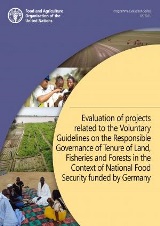Evaluation of FAO's Voluntary Guidelines on Responsible Governance of Tenure

The Voluntary Guidelines on the Responsible Governance of Tenure of Land, Fisheries and Forests (VGGT) is an international agreement on the governance of tenure that promotes secure tenure rights and equitable access to land, fisheries and forests as a means of eradicating hunger and poverty, supporting sustainable development and enhancing the environment. FAO has been promoting the VGGT in several countries and the Federal Republic of Germany had significantly contributed by financially supporting FAO’s activities.
This evaluation was requested by Germany to assess results and draw lessons from the implementation of such activities. The evaluation started with a workshop involving the main implementing partners to identify main changes generated by the programme followed by six country case studies covering all the countries benefiting from German funds: Liberia, Mali, Mauritania, Mongolia, Senegal and Sierra Leone.
A major outcome of the VGGT programme has been the promotion of an inclusive dialogue through multi-stakeholder platforms which led in most countries to the emergence of a common vision on land governance and positively influenced the land reform processes with variable results. The programme significantly contributed to changes in mind-set which are needed for long-term improvements at country level. The inclusiveness of the platforms, bringing civil society and government together, was an important mechanism in initiating this process. Capacity development activities and awareness raising efforts had population-wide effects that contributed to the process. Such changes in mind-set, while requiring time, did have observable changes in terms of recognition of customary land rights, women’s land rights, policy change and use of institutions to resolve problems.
Results have shown that the VGGT, while being international principles of land policy, can be translated into concrete actions at the local level. Indeed, the experiences of the local platforms in the Senegal River Basin region and the mapping exercise in Sierra Leone are the concrete actions that attracted the most attention and generated significant demand for replication. Particularly successful was also the strategy of including awareness raising efforts on women’s access to land as part of local concrete activities.
The evaluation stressed the need for greater attention on developing concrete activities to be carried out in local communities which result in defined, precise and achievable gains on governance of tenure (conflict resolution, mapping, women’s rights, etc.). There remains also a significant demand to continue working on women and youth land access issues.

